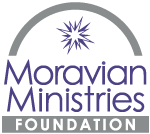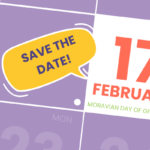A Cheerful Giver
“God loves a cheerful giver,” 2 Corinthians 9:7 (RSV). How often have we heard those words in the church or at home? I admit I’ve reminded my kids of that on more than one occasion. My wife would say she has reminded me as well. We often get wrapped up in our own worlds, and today’s culture is more “me-centered” than ever. Just look at social media, the news, or even your neighborhood—you’ll see where the focus lies. For faith leaders, this makes it harder to communicate why people should support ministry financially.
God’s First Planned Gift
When we open Scripture, follow the example of Christ, or learn from the teachings of the Moravian Church, our focus shifts back to God and others. In Genesis 3, where God curses the serpent, we see a reference to the Messiah and the ultimate victory over sin and death. God’s gift of Christ was, in a sense, the first planned gift—planned before the foundation of the world. The ultimate gift of a precious life, to save sinners. How could we not want to respond to that?
What Are Planned Gifts?
Planned gifts are simply gifts that require forethought and strategy. They may be small or large, but they always serve a donor’s personal plan or goal. It humbles me to work with Moravians who have made such sacrificial plans for causes that matter to them. Consider:
- What activity do you want to strengthen?
- What organization do you want to support?
- How can planning a gift help meet your larger goals?

MMFA stands ready to help you explore options. Some factors to consider:
- What do you hope this gift will accomplish?
- Do you need income for a set number of years or for your lifetime?
- What assets will you use to fund the gift?
- Will you make this gift now, in the future, or through your estate?
- Do you prefer an outright gift, or creating a fund that fulfills your plans for years to come?
Why Churches and Agencies Should Care
Planned gifts matter for ministries as well. Research shows that donors who create planned gifts often give more during their lifetimes after establishing such a plan. Churches can encourage generosity by including reminders in bulletins, newsletters, and fellowship conversations.
Earlier this year, I spoke at a Sunday fellowship about planned giving. A month later, when I returned, I met with individuals and couples by appointment. They asked questions, received confidential advice, and made plans. Some created immediate gifts, while others planted seeds for the future. Could your church benefit from a similar effort?
The Joy of Planning Your Gift
Join us on October 29 for our planned giving webinar. We’ll explore three specific types of gifts and share examples from Moravians who have made these plans. If you’re curious about planned giving, this is a wonderful opportunity to learn.
Remember our opening: “God loves a cheerful giver.” Planned giving provides an opportunity to experience joy at a deeper level, no matter the amount. God loved us so much that He created a plan for us. Will you create a plan for Him?









